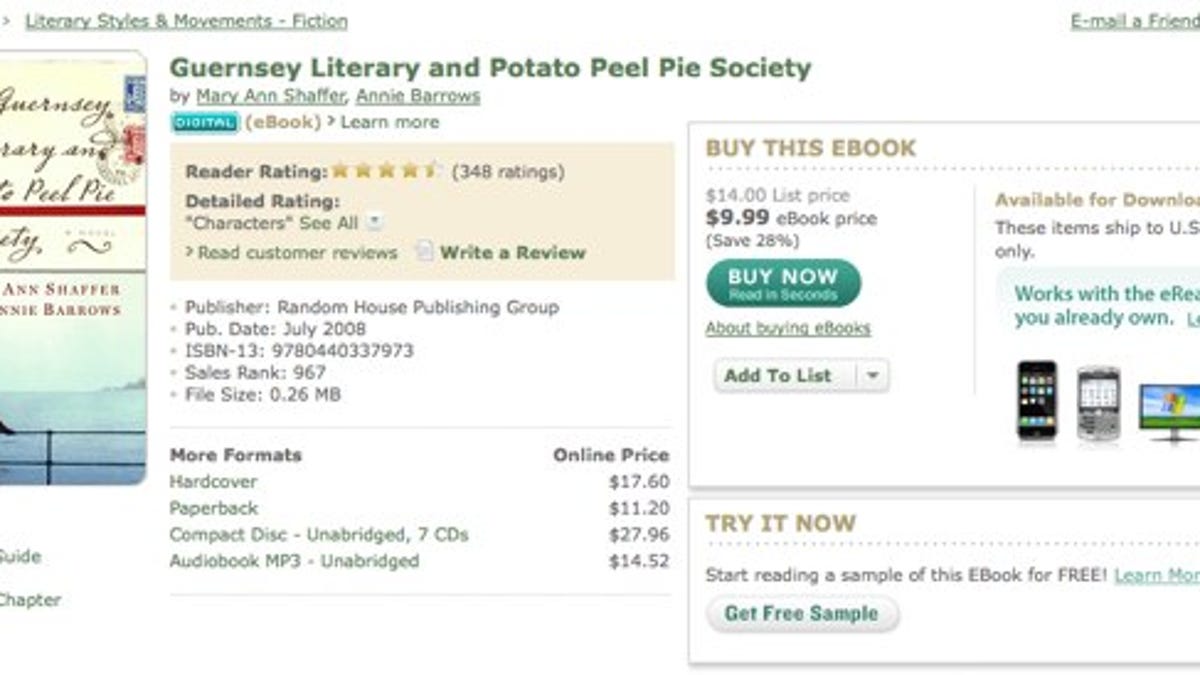Will Barnes & Noble stores give its e-books a boost?
Barnes & Noble is taking aim at Amazon.com in the e-book market. But can its brick-and-mortar stores help it achieve success?

Barnes & Noble on Monday announced that it's getting back into the e-book market. The company said in a statement that its new e-book store has more than 700,000 books for sale--far more than the 300,000 books available for download from Amazon.com's Kindle store.
Similar to Amazon's strategy, Barnes & Noble e-books can be downloaded directly onto an iPhone or iPod Touch. They will also be integrated into Plastic Logic's upcoming e-reader, which is expected to hit store shelves sometime next year.
It's an exciting announcement for the retailer. The company tried once before to break into the e-book market. But by not providing an easy delivery method to help users read the books, it failed in 2003.
Going forward, Barnes & Noble believes that it can compete on the same level as Amazon, which has enjoyed a head start in the space. But just how can it get ahead in the market? The Kindle is available to users now, Amazon has its own e-books available on the same platforms to which Barnes & Noble books will be made available, and both companies are known and trusted in the book market.
As far as I can tell, those 700 Barnes & Noble locations are the only factor potentially giving it an advantage. But can brick-and-mortar stores really cement success for Barnes & Noble's e-book endeavors?
For some people, the bookstore is a waste of time. Instead of thumbing through books on shelves, they'd rather sit at their computers, check out titles quickly on the Web, and decide which they want to buy. Some of those folks want to hold the book, so they have it delivered to their homes. Others decide to buy it for a cheaper price on their Kindle, iPhone, or other e-reader.
But it's that group of folks who do care about the bookstore on whom Barnes & Noble can capitalize far more effectively than Amazon can. Sure, those users can flip through synopses online, but going to the bookstore is more than that to them. They want to read a couple chapters. They want to check out specific sections. They want to sip some espresso at the coffee shop inside the store. They are going to the bookstore to enjoy an experience.
By bringing e-books and (eventually) an e-reader to customers, Barnes & Noble has an opportunity to appeal to that second group. It can integrate downloading e-books into each of those stores. It could also sell e-readers at checkout. That strategy could significantly improve Barnes & Noble's chances of competing.
Conceivably, all those coffee shops at Barnes & Noble won't be filled with folks flipping through pages of a hardcover. Instead, some might be sipping some coffee while reading a book they just downloaded from Barnes & Noble's e-book service.
But then again, that's not an easy scenario to picture. Online purchases are more convenient, and as Barnes & Noble's financial data has shown, times are tough.
In the end, it's you who will determine if the company's stores may give it a competitive advantage for e-books. So what do you think? Will you be buying e-books at your local B&N?
Check out Don's Facebook profile, Twitter stream, and FriendFeed.

